| S8048 |
Venetoclax (ABT-199)
|
Venetoclax (ABT-199, GDC-0199) is a Bcl-2-selective inhibitor with Ki of <0.01 nM in cell-free assays, >4800-fold more selective versus Bcl-xL and Bcl-w, and no activity to Mcl-1. This compound is reported to induce cell growth suppression, apoptosis, cell cycle arrest, and autophagy in triple negative breast cancer MDA-MB-231 cells. Phase 3.
|
-
Cell, 2025, S0092-8674(25)00689-0
-
Cell, 2025, S0092-8674(25)01233-4
-
Signal Transduct Target Ther, 2025, 10(1):161
|
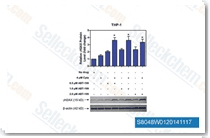
|
| S1002 |
ABT-737
|
ABT-737 is a BH3 mimetic inhibitor of Bcl-xL, Bcl-2 and Bcl-w with EC50 of 78.7 nM, 30.3 nM and 197.8 nM in cell-free assays, respectively; no inhibition observed against Mcl-1, Bcl-B or Bfl-1. ABT-737 induces mitochondrial pathway apoptosis and mitophagy. Phase 2.
|
-
Signal Transduct Target Ther, 2025, 10(1):161
-
J Hepatol, 2025, S0168-8278(24)02830-7
-
Cell Rep Med, 2025, S2666-3791(25)00057-6
|
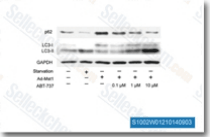
|
| S1001 |
Navitoclax (ABT-263)
|
A potent inhibitor of Bcl-xL, Bcl-2 and Bcl-w with Ki of ≤ 0.5 nM, ≤1 nM and ≤1 nM in cell-free assays, Navitoclax (ABT-263) binds more weakly to Mcl-1 and A1. Phase 2.
|
-
Cell, 2025, S0092-8674(25)00689-0
-
Nat Cancer, 2025, 6(2):259-277
-
Nat Metab, 2025, 7(12):2474-2488.
|
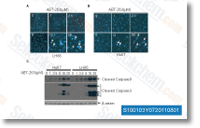
|
| S1057 |
Obatoclax Mesylate (GX15-070)
|
Obatoclax Mesylate (GX15-070) is an antagonist of Bcl-2 with Ki of 0.22 μM in a cell-free assay, can assist in overcoming MCL-1 mediated resistance to apoptosis.
|
-
Nat Commun, 2025, 16(1):2416
-
bioRxiv, 2024, 10.1101/2023.01.18.524628
-
Emerg Microbes Infect, 2022, 1-29
|
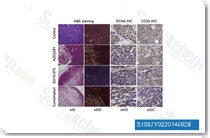
|
| S8383 |
S63845
|
S63845 is a new, selective MCL-1 inhibitor with the Kd value of 0.19 nM and has no discernible binding to the other BCL-2 members, BCL-2 or BCL-XL.
|
-
Mol Cancer, 2025, 24(1):154
-
Nat Commun, 2025, 16(1):7853
-
Nat Commun, 2025, 16(1):4563
|
|
| S7790 |
A-1210477
|
A-1210477 is a potent and selective MCL-1 inhibitor with Ki and IC50 of 0.454 nM and 26.2 nM, respectively, >100-fold selectivity over other Bcl-2 family members.
|
-
Front Pharmacol, 2025, 16:1530270
-
Front Pharmacol, 2025, 16:1530270
-
Cell Rep, 2023, 42(10):113176
|
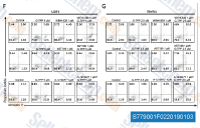
|
| S1121 |
TW-37
|
TW-37 is a novel nonpeptide inhibitor to recombinant Bcl-2, Bcl-xL and Mcl-1 with Ki of 0.29 μM, 1.11 μM and 0.26 μM in cell-free assays, respectively.
|
-
Signal Transduct Target Ther, 2025, 10(1):161
-
bioRxiv, 2024, 10.1101/2023.01.18.524628
-
Cells, 2023, 12(18)2247
|
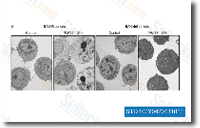
|
| S7801 |
A-1331852
|
A-1331852 is a potent and selectiveBCL-XL inhibitor with Ki value less than 0.01 nM for BCL-XL and 6 nM, 4 nM, 142 nM for Bcl-2, Bcl-W, MCL-1 respectively. It may be useful in the treatment of cancer, immune and autoimmune diseases.
|
-
Cell, 2025, S0092-8674(25)00689-0
-
Mol Cancer, 2025, 24(1):154
-
Haematologica, 2025, 110(1):78-91
|
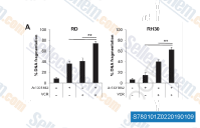
|
| S7800 |
A-1155463 Dihydrochloride
|
A-1155463 Dihydrochloride, a highly potent and selective BCL-XL inhibitor, shows picomolar binding affinity to BCL-XL, and >1000-fold weaker binding to BCL-2 and related proteins BCL-W(Ki=19 nM) and MCL-1(Ki>440 nM).
|
-
Front Pharmacol, 2025, 16:1530270
-
Front Pharmacol, 2025, 16:1530270
-
iScience, 2024, 27(1):108503
|
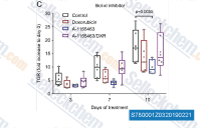
|
| S7531 |
UMI-77
|
UMI-77 is a selective Mcl-1 inhibitor with Ki of 490 nM, showing selectivity over other members of Bcl-2 family.
|
-
iScience, 2024, 27(1):108503
-
Blood, 2022, blood.2021014304
-
Nat Commun, 2022, 13(1):6226
|
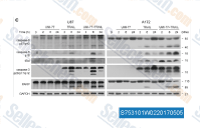
|
| S2812 |
(R)-(-)-Gossypol (AT-101) acetic acid
|
(R)-(-)-Gossypol (AT-101) acetic acid, the R-(-) enantiomer of Gossypol acetic acid, binds with Bcl-2, Bcl-xL and Mcl-1 with Ki of 0.32 μM, 0.48 μM and 0.18 μM in cell-free assays; does not inhibit BIR3 domain and BID. AT-101 simultaneously triggers apoptosis and a cytoprotective type of autophagy. Phase 2.
|
-
Protein Cell, 2024, pwad065
-
Int J Mol Sci, 2023, 24(7)6662
-
Leiden University
The Netherlands, 2023,
|
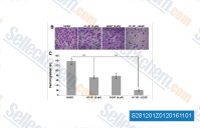
|
| S8643 |
AZD5991
|
AZD5991 is a macrocyclic MCL-1 inhibitor with sub-nanomolar affinity for MCL-1 (Ki = 0.13 nM). The binding affinity of this compound is about 25-fold lower for mouse Mcl-1 vs. human Mcl-1 but only four-fold lower for rat Mcl-1.
|
-
Theranostics, 2025, 15(7):2834-2851
-
Theranostics, 2025, 15(12):5705-5718
-
Cell Death Differ, 2025, 10.1038/s41418-025-01514-7
|
|
| S8061 |
Sabutoclax
|
Sabutoclax (BI-97C1) is a pan-Bcl-2 inhibitor, including Bcl-xL, Bcl-2, Mcl-1 and Bfl-1 with IC50 of 0.31 μM, 0.32 μM, 0.20 μM and 0.62 μM, respectively.
|
-
Cells, 2023, 12(18)2247
-
Cells, 2023, 10.3390/cells12182247
-
Mol Divers, 2022, 10.1007/s11030-022-10494-6
|
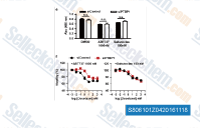
|
| S7100 |
WEHI-539
|
WEHI-539 has high affinity (IC50=1.1 nM) and selectivity for BCL-XL and potently kills cells by selectively antagonizing its prosurvival activity. This compound has more than a 400-fold higher affinity for BCL-XL versus other prosurvival BCL-2 family members.
|
-
bioRxiv, 2025, 2025.06.10.658786
-
Cell Rep Med, 2023, 4(11):101290
-
Leiden University
The Netherlands, 2023,
|
|
| S1071 |
HA14-1
|
HA14-1 is a non-peptidic ligand of a Bcl-2 surface pocket with IC50 of ~9 μM.
|
-
Cell Rep, 2025, 44(5):115617
-
Platelets, 2020, 10.1080/09537104.2020.1724276
-
Oncotarget, 2018, 9(24):16701-16717
|
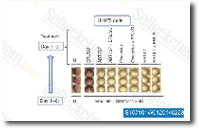
|
| S8836 |
MIK665 (S64315)
|
MIK665 (S64315) is an inhibitor of induced myeloid leukemia cell differentiation protein Mcl-1 with Ki value of 1.2 nM and has potential pro-apoptotic and antineoplastic activities.
|
-
Biochem Biophys Res Commun, 2025, 784:152650
-
Nat Commun, 2024, 15(1):1581
-
Cancer Biol Ther, 2024, 25(1):2427374
|
|
| S6709 |
Obatoclax (GX15-070)
|
Obatoclax (GX15-070) is an antagonist of Bcl-2 with an Ki of 0.22 μM in a cell-free assay, can assist in overcoming MCL-1 mediated resistance to apoptosis.
|
-
Signal Transduct Target Ther, 2025, 10(1):161
-
Oncotarget, 2024, 15:614-633
-
Cells, 2023, 12(18)2247
|
|
| S2448 |
Gambogic Acid
|
Gambogic Acid (Guttatic Acid, Guttic Acid, Beta-Guttiferrin) activates caspases with EC50 of 0.78-1.64 μM and competitively inhibits Bcl-XL, Bcl-2, Bcl-W, Bcl-B, Bfl-1 and Mcl-1 with IC50 of 1.47, 1.21, 2.02, 0.66, 1.06 and 0.79 μM, respectively.
|
-
Theranostics, 2025, 15(11):5420-5439
-
Cells, 2023, 12(18)2247
-
Cells, 2023, 10.3390/cells12182247
|
|
| S7126 |
Marinopyrrole A (Maritoclax)
|
Maritoclax (Marinopyrrole A) is a selective Mcl-1 antagonist that binds to Mcl-1, but not Bcl-XL, and targets it for proteasomal degradation. This compound disrupts the interaction between Bim and Mcl-1 with an IC50 of 10.1 μM.
|
-
Clin Cancer Res, 2023, 29(2):446-457
-
Clin Cancer Res, 2023, 29(2):446-457
-
Cell Signal, 2022, S0898-6568(22)00041-9
|
|
| S8865 |
BAI1
|
BAI1 is a direct allosteric inhibitor of BAX with a dissociation constant (Kd) of 15.0 ± 4 μM.
|
-
Biomed Pharmacother, 2025, 187:118049
-
Int J Hyperthermia, 2024, 41(1):2325489
-
Nat Commun, 2023, 14(1):865
|
|
| E2926 |
A-1155463
|
A-1155463 is a highly potent and selective BCL-XL inhibitor with EC50 of 65 nM in H146 cells.
|
-
Nat Commun, 2025, 16(1):256
-
Cell Rep Med, 2025, 6(6):102160
-
Theranostics, 2025, 15(12):5705-5718
|
|
| S8650 |
BTSA1
|
BTSA1 is a pharmacologically optimized BAX activator that binds with high affinity and specificity to the N-terminal activation site and induces conformational changes to BAX leading to BAX-mediated apoptosis. It effectively promotes apoptosis in leukemia cell lines and patient samples while sparing healthy cells.
|
-
bioRxiv, 2024, 10.1101/2023.01.18.524628
-
Cell Mol Life Sci, 2023, 80(10):311
-
Cell Mol Life Sci, 2023, 80(10):311
|
|
| S8759 |
S55746
|
S55746 (S 055746,BCL201) is a novel, orally active BCL-2 specific inhibitor (Ki = 1.3 nM) with poor affinity for BCL-XL and no significant binding to MCL-1, BFL-1 (BCL2A1/A1). The selectivity of this compound for BCL-2 versus BCL-XL ranges from ~70 to 400 folds.
|
-
Cells, 2023, 12(18)2247
-
Cells, 2023, 10.3390/cells12182247
-
Signal Transduct Target Ther, 2022, 7(1):51
|
|
| S7105 |
BAM7
|
BAM 7 is a direct and selective activator of proapoptotic Bax with EC50 of 3.3 μM.
|
-
Nat Chem Biol, 2019, 15(4):322-330
-
Cell Death Discov, 2018, 4:107
-
Baltimore, Maryland , 2018,
|
|
| S8199 |
Ruxotemitide (LTX 315)
|
Ruxotemitide (LTX 315) is the oncolytic peptide that kills cancer cells through Bax/Bak-regulated mitochondrial membrane permeabilization.
|
-
J Immunother Cancer, 2022, 10(3)e004129
-
Nat Metab, 2021, 10.1038/s42255-021-00491-8
|
|
| S7849 |
BDA-366
|
BDA-366 is a small-molecule Bcl2-BH4 domain antagonist and binds BH4 with high affinity and selectivity. It directly binds to Bcl2 with high binding affinity (Ki =3.3 ± 0.73 nM).
|
-
Biochem Pharmacol, 2025, S0006-2952(25)00712-9
-
BMC Cancer, 2023, 23(1):479
|
|
| S0563 |
10-Deacetyl-7-xylosyl paclitaxel
|
10-Deacetyl-7-xylosyl paclitaxel (10-Deacetyl-7-xylosyltaxol, 7-xylosyl-10-deacetylpaclitaxel), a derivative of paclitaxel and naturally occurring xyloside isolated from Taxus chinensis, causes significant mitotic arrest in PC-3 cells followed by up-regulating expression of pro-apoptotic Bax and Bad protein, as well as down-regulating expression of anti-apoptotic Bcl-2 and Bcl-XL , which leads to a disturbance of the mitochondrial membrane permeability and to the activation of caspase-9.
|
-
Cell Death Dis, 2022, 13-9:799
|
|
| E3037 |
Solanum lyratum Extract
|
Solanum lyratum Extract (300 μg/ml) increases Bax levels and decreases Bcl-2 levels, which cause the loss of mitochondrial membrane potential (Δæm) followed by cytochrome C release and caspase-9 and -3 activation, finally leading to apoptosis. This compound also promotes p53 and p27, but decreases the levels of cyclin B1 thus causing S-phase arrest.
|
|
|
| S9970 |
APG-2575 (lisaftoclax)
|
APG-2575 (lisaftoclax) is a dual Bcl-2 and Bcl-xl inhibitor with IC50 values of 2 nM and 5.9 nM for Bcl-2 and Bcl-xl, respectively.
|
|
|
| E8278New |
WH244
|
WH244 is a second-generation PROTAC that selectively degrades the anti-apoptotic proteins BCL-xL and BCL-2 with a DC50 of 0.6 nM for BCL-xL and 7.4 nM for BCL-2.
|
|
|
| S3243 |
Zeaxanthin
|
Zeaxanthin, the carotenoid alcohol participates in the xanthophyll cycle, activates the extrinsic apoptosis pathway which induces apoptosis on uveal melanoma cells with IC50 value 40.8 µM.
|
|
|
| E0011 |
Linderalactone
|
Linderalactone inhibits human lung cancer growth by modulating the expression of apoptosis-related proteins (Bax and Bcl-2) with an IC50 of 15 µM in A-549 cells. This compound induces G2/M cell cycle arrest and could also suppress the JAK/STAT signalling pathway. It can be isolated from Radix linderae.
|
|
|
| S9276 |
Alisol B
|
Alisol B, a triterpene from Alismatis rhizoma, induces Bax up-regulation and nuclear translocation, the activation of initiator caspase-8 and caspase-9, and executor caspase-3, suggesting the involvement of both extrinsic and intrinsic apoptosis pathways.
|
|
|
| E1510 |
Sonrotoclax
|
Sonrotoclax(BGB-11417) is a highly potent, orally active and selective inhibitor of Bcl2. This compound demonstrates increased potency along with in vitro and in vivo inhibitory activity against both WT Bcl-2 and the G101V mutant. Bcl-xL It has effective cell killing effect against a variety of lymphoma and leukemia cell lines.
|
|
|
| S5600 |
Flavokawain A
|
Flavokawain A, extracted from kava, is an apoptotic inducers and anticarcinogenic agent. This compound can down-regulation of antiapoptotic proteins, such as XIAP, survivin, and Bcl-xL, thereby changing the balance between apoptotic and antiapoptotic molecules and then induce cell death in tumor cells.
|
|
|
| S8177 |
BH3I-1
|
BH3I-1 is a Bcl-XL-BH3 domain interaction inhibitor with Ki of 2.4 μM (by fluorescence polarization ).This compound is a selective inhibitor of Bcl-2 family proteins.
|
|
|
| S8924 |
DT2216
|
DT2216 is a potent and selective degrader of BCL-XL based on PROTAC technology. DT2216 inhibits various BCL-XL-dependent leukemia and cancer cells but considerably less toxic to platelets.
|
|
|
| S6004 |
CCI-007
|
CCI-007 is a novel small molecule with cytotoxic activity against infant leukemia with MLL rearrangements.
|
|
|
| S8758 |
VU661013
|
VU661013 is a novel, potent, selective MCL1 inhibitor with Ki of 97 ± 30 pM of human MCL-1 in a TR-FRET assay. However, this compound does not significantly inhibit BCL-xL or BCL-2 with Ki > 40 μM or = 0.73 μM. It de-stabilizes BIM/MCL-1 association, leads to apoptosis in AML.
|
-
Gastric Cancer, 2025, 10.1007/s10120-025-01630-w
|
|
| S8550 |
Tapotoclax (AMG-176)
|
Tapotoclax (AMG-176) is a potent, selective, and orally bioavailable macrocyclic inhibitor of MCL1 with a Ki of 0.13 nM. It induces a potent apoptosis in models of hematologic malignancies.
|
|
|
| E2663 |
BT2
|
BT2 is a novel branched-chain α-ketoacid dehydrogenase complex kinase (BDK) inhibitor wieh an IC50 of 3.19 μM.
|
|
|
| E5962New |
BRD-810
|
BRD-810 is a potent and highly selective inhibitor of MCL1. BRD-810 targets the BH3-binding pocket of MCL1 and blocks the capturing of pro-apoptotic proteins, thereby rapidly triggering caspase activation in MCL1-dependent cells. It demonstrates potent anti-tumor effects in both hematologic malignancies and solid tumor models.
|
|
|
| E3020 |
Hedyotic Diffusa Extract
|
Hedyotic Diffusa Extract is extracted from Hedyotic diffusa, of which polysaccharides inhibit the growth of CNE2 cells in a dose-and-time-dependent way, the mechanism may involve induction of cell apoptosis, which is associated with the activation of Bax and caspase-3 protein and the down-regulation of Bcl-2 protein expression.
|
|
|
| S7747 |
Ro-3306
|
RO-3306 is an ATP-competitive, and selective CDK1 inhibitor with Ki of 20 nM, >15-fold selectivity against a diverse panel of human kinases. RO-3306 enhances p53-mediated Bax activation and mitochondrial apoptosis.
|
-
Nat Commun, 2025, 16(1):7898
-
Nat Commun, 2025, 16(1):6439
-
Nucleic Acids Res, 2025, 53(21)gkaf1179
|
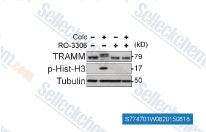
|
| S2606 |
Mifepristone (RU486)
|
Mifepristone is a remarkably active antagonist of progesterone receptor and glucocorticoid receptor with IC50 of 0.2 nM and 2.6 nM, respectively. Mifepristone promotes cell autophagy and apoptosis, decreases Bcl-2 level and increases Beclin1 level, accompanied by weakened interaction between Bcl-2 and Beclin1.Mifepristone (RU486) can be used to induce animal models of Spontaneous Abortion.
|
-
Pharmacol Res, 2025, 215:107696
-
Cell Death Dis, 2025, 16(1):237
-
J Virol, 2025, 99(2):e0147224
|
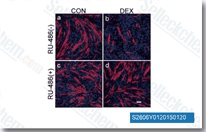
|
| S8820 |
Unesbulin (PTC596)
|
Unesbulin (PTC596) is a second-generation BMI-1 inhibitor that accelerates BMI-1 degradation. This compound downregulates MCL-1 and induces p53-independent mitochondrial apoptosis. IC50 values at 72 hours ranged from 68 to 340 nM in mantle cell lymphoma (MCL) cell lines.
|
-
Cell Rep Med, 2025, S2666-3791(25)00150-8
-
NPJ Precis Oncol, 2024, 8(1):68
-
PLoS One, 2023, 18(2):e0277313
|
|
| S6852 |
Gossypol
|
Gossypol (BL 193) is an orally-active polyphenol isolated from cotton seeds and roots. This compound is a potent inhibitor of 5α-reductase 1 and 3α-hydroxysteroid dehydrogenase with IC50 of 3.33 μM and 0.52 μM in cell-free assay, respectively. It also inhibits the binding of BH3 peptide to Bcl protein with IC50 of 0.4 μM and 10 μM for Bcl-XL and Bcl-2, respectively. This chemical induces apoptosis and cell growth inhibition in various cancer cells.
|
-
iScience, 2024, 27(10):110862
-
Cells, 2023, 12(18)2247
-
Cells, 2023, 10.3390/cells12182247
|
|
| S3275 |
Senkyunolide I
|
Senkyunolide I (SEI, SENI) is an orally active compound isolated from Ligusticum chuanxiong with analgesic, anti-migraine, neuroprotective, anti-oxidation and anti-apoptosis activities. This compound up-regulates the phosphorylation of Erk1/2 and induces Nrf2 nuclear translocation with enhanced HO-1 and NQO1 expressions. It also promotes the ratio of Bcl-2/Bax and inhibits the expressions of cleaved caspase 3 and caspase 9.
|
-
Blood Sci, 2025, 7(3):e00246
-
iScience, 2024, 27(7):110367
-
World J Emerg Med, 2024, 15(3):206-213
|
|
| S5967 |
Berberine chloride hydrate
|
Berberine (Natural Yellow 18) chloride hydrate is a quaternary ammonium salt from the group of isoquinoline alkaloids. Berberine activates caspase 3 and caspase 8, cleavage of poly ADP-ribose polymerase (PARP) and the release of cytochrome c. Berberine chloride decreases the expression of c-IAP1, Bcl-2 and Bcl-XL. Berberine chloride induces apoptosis with sustained phosphorylation of JNK and p38 MAPK, as well as generation of the ROS. Berberine chloride is a dual topoisomerase I and II inhibitor. Berberine chloride is also a potential autophagy modulator.
|
-
Front Biosci (Landmark Ed), 2022, 27(8):242
-
Front Pharmacol, 2021, 12:632201
|
|
| S3238 |
Resibufogenin
|
Resibufogenin (Bufogenin, Recibufogenin), a component of huachansu with anticancer effect, triggers necroptosis through upregulating receptor-interacting protein kinase 3 (RIP3) and phosphorylating mixed lineage kinase domain-like protein at Ser358. This compound exerts cytotoxic effect by inducing reactive oxygen species (ROS) accumulation. It induces apoptosis and caspase-3 and caspase-8 activity. This chemical increases Bax/Bcl-2 expression, and suppresses cyclin D1, cyclin E, PI3K, p-AKT, p-GSK3β and β-catenin protein expression.
|
-
bioRxiv, 2025, 2025.07.17.665404
-
Research Square, 2024, 10.21203/rs.3.rs-3790060/v1
-
Phytomedicine, 2022, 102:154182
|
|
| E0124 |
Chelerythrine
|
Chelerythrine (Toddaline, Broussonpapyrine) is a potent, selective antagonist of PKC with an IC50 of 0.66 μM. This compound also inhibits the BclXL-Bak BH3 peptide binding with an IC50 of 1.5 μM. It shows antitumor, antidiabetic and anti-inflammatory activity.
|
-
Nutr Neurosci, 2022, 1-19
|
|
| S3224 |
Cinobufagin
|
Cinobufagin (Cinobufagine), an active ingredient of Venenum Bufonis, inhibits tumor development. This compound increases ATM and Chk2 and decreases CDC25C, CDK1, and cyclin B. It inhibits PI3K, AKT and Bcl-2 while increases levels of cleaved caspase-9 and caspase-3. Thus, this chemical induces cell cycle arrest at the G2/M phase and apoptosis.
|
|
|
| S6895 |
TCPOBOP
|
TCPOBOP is a constitutive androstane receptor (CAR) agonist. This compound attenuates Fas-induced murine liver injury by altering Bcl-2 proteins.
|
|
|
| S3245 |
Nodakenetin
|
Nodakenetin (NANI), a plant-derived coumarin isolated from Angelica decursiva, inhibits α-glucosidase, PTP1B, rat lens aldose reductase (RLAR), AChE, BChE, and β-site amyloid precursor protein cleaving enzyme 1 (BACE1). This compound alters the protein expression of Bax and Bcl-2, and prompts mitochondrial apoptosis. It exhibits anti-tumor activity.
|
|
|
| S3267 |
Nicotiflorin (Kaempferol-3-O-rutinoside)
|
Nicotiflorin (Kaempferol-3-O-rutinoside), a flavonoid extracted from Carthamus tinctorius, alters the shape and structure of injured neurons, decreases the number of apoptotic cells, down-regulates expression of p-JAK2, p-STAT3, caspase-3, and Bax and decreases Bax immunoredactivity, and increases Bcl-2 protein expression and immunoreactivity.
|
|
|
| E2354 |
Valepotriate
|
Valepotriate, an unstable iridoid isolated from Valeriana jatamansi Jones, has anti-epileptic by significantly increasing the expression of GABAA, glutamic acid decarboxylase 65, and Bcl-2 and reduce the expression of caspase-3.
|
|
|
| E2028 |
Humanin
|
Humanin (human) (1-24-Protein humanin (human)), a small mitochondrial-derived cytoprotective polypeptide encoded by mtDNA, exhibits protective effects in several cell types against cellular stress conditions and apoptosis through regulating various signaling mechanisms, such as JAK/STAT pathway and interaction of BCL-2 family of protein.
|
|
|
| S2271 |
Berberine chloride
|
Berberine chloride is a quaternary ammonium salt from the group of isoquinoline alkaloids. This compound activates caspase 3 and caspase 8, cleavage of poly ADP-ribose polymerase (PARP) and the release of cytochrome c. It decreases the expression of c-IAP1, Bcl-2 and Bcl-XL. This chemical induces apoptosis with sustained phosphorylation of JNK and p38 MAPK, as well as generation of the ROS. It is a dual topoisomerase I and II inhibitor. It is also a potential autophagy modulator.
|
-
J Cardiovasc Dev Dis, 2025, 12(7)278
-
Adv Healthc Mater, 2023, e2300591.
-
Transl Oncol, 2023, 35:101712
|
|
| S9665 |
Motixafortide (BKT140)
|
Motixafortide (BL-8040, BKT140, TF 14016, 4-fluorobenzoyl, 4F-benzoyl-TN14003, T140) is an antagonist of CXCR4 with IC50 of ~1 nM. BL-8040 induces the apoptosis of AML blasts by down-regulating ERK, BCL-2, MCL-1 and cyclin-D1 via altered miR-15a/16-1 expression.
|
-
King's College London, 2023,
|
|
| S5550 |
Ethyl gallate
|
Ethyl gallat (Phyllemblin, gallic acid ethyl ester), which could be found naturally in a variety of plant sources, is a food additive with antimicrobial activity. Ethyl gallat activates the death receptor-dependent pathway of apoptosis by enhancing the expression of caspases-8, -9, and -3 and the Bcl-2 interacting domain (Bid).
|
-
Front Pharmacol, 2024, 15:1403424
|
|
| S8048 |
Venetoclax (ABT-199)
|
Venetoclax (ABT-199, GDC-0199) is a Bcl-2-selective inhibitor with Ki of <0.01 nM in cell-free assays, >4800-fold more selective versus Bcl-xL and Bcl-w, and no activity to Mcl-1. This compound is reported to induce cell growth suppression, apoptosis, cell cycle arrest, and autophagy in triple negative breast cancer MDA-MB-231 cells. Phase 3. |
- Cell, 2025, S0092-8674(25)00689-0
- Cell, 2025, S0092-8674(25)01233-4
- Signal Transduct Target Ther, 2025, 10(1):161
|

|
| S1002 |
ABT-737
|
ABT-737 is a BH3 mimetic inhibitor of Bcl-xL, Bcl-2 and Bcl-w with EC50 of 78.7 nM, 30.3 nM and 197.8 nM in cell-free assays, respectively; no inhibition observed against Mcl-1, Bcl-B or Bfl-1. ABT-737 induces mitochondrial pathway apoptosis and mitophagy. Phase 2. |
- Signal Transduct Target Ther, 2025, 10(1):161
- J Hepatol, 2025, S0168-8278(24)02830-7
- Cell Rep Med, 2025, S2666-3791(25)00057-6
|

|
| S1001 |
Navitoclax (ABT-263)
|
A potent inhibitor of Bcl-xL, Bcl-2 and Bcl-w with Ki of ≤ 0.5 nM, ≤1 nM and ≤1 nM in cell-free assays, Navitoclax (ABT-263) binds more weakly to Mcl-1 and A1. Phase 2. |
- Cell, 2025, S0092-8674(25)00689-0
- Nat Cancer, 2025, 6(2):259-277
- Nat Metab, 2025, 7(12):2474-2488.
|

|
| S8383 |
S63845
|
S63845 is a new, selective MCL-1 inhibitor with the Kd value of 0.19 nM and has no discernible binding to the other BCL-2 members, BCL-2 or BCL-XL.
|
- Mol Cancer, 2025, 24(1):154
- Nat Commun, 2025, 16(1):7853
- Nat Commun, 2025, 16(1):4563
|
|
| S7790 |
A-1210477
|
A-1210477 is a potent and selective MCL-1 inhibitor with Ki and IC50 of 0.454 nM and 26.2 nM, respectively, >100-fold selectivity over other Bcl-2 family members. |
- Front Pharmacol, 2025, 16:1530270
- Front Pharmacol, 2025, 16:1530270
- Cell Rep, 2023, 42(10):113176
|

|
| S1121 |
TW-37
|
TW-37 is a novel nonpeptide inhibitor to recombinant Bcl-2, Bcl-xL and Mcl-1 with Ki of 0.29 μM, 1.11 μM and 0.26 μM in cell-free assays, respectively. |
- Signal Transduct Target Ther, 2025, 10(1):161
- bioRxiv, 2024, 10.1101/2023.01.18.524628
- Cells, 2023, 12(18)2247
|

|
| S7801 |
A-1331852
|
A-1331852 is a potent and selectiveBCL-XL inhibitor with Ki value less than 0.01 nM for BCL-XL and 6 nM, 4 nM, 142 nM for Bcl-2, Bcl-W, MCL-1 respectively. It may be useful in the treatment of cancer, immune and autoimmune diseases. |
- Cell, 2025, S0092-8674(25)00689-0
- Mol Cancer, 2025, 24(1):154
- Haematologica, 2025, 110(1):78-91
|

|
| S7800 |
A-1155463 Dihydrochloride
|
A-1155463 Dihydrochloride, a highly potent and selective BCL-XL inhibitor, shows picomolar binding affinity to BCL-XL, and >1000-fold weaker binding to BCL-2 and related proteins BCL-W(Ki=19 nM) and MCL-1(Ki>440 nM). |
- Front Pharmacol, 2025, 16:1530270
- Front Pharmacol, 2025, 16:1530270
- iScience, 2024, 27(1):108503
|

|
| S7531 |
UMI-77
|
UMI-77 is a selective Mcl-1 inhibitor with Ki of 490 nM, showing selectivity over other members of Bcl-2 family. |
- iScience, 2024, 27(1):108503
- Blood, 2022, blood.2021014304
- Nat Commun, 2022, 13(1):6226
|

|
| S2812 |
(R)-(-)-Gossypol (AT-101) acetic acid
|
(R)-(-)-Gossypol (AT-101) acetic acid, the R-(-) enantiomer of Gossypol acetic acid, binds with Bcl-2, Bcl-xL and Mcl-1 with Ki of 0.32 μM, 0.48 μM and 0.18 μM in cell-free assays; does not inhibit BIR3 domain and BID. AT-101 simultaneously triggers apoptosis and a cytoprotective type of autophagy. Phase 2. |
- Protein Cell, 2024, pwad065
- Int J Mol Sci, 2023, 24(7)6662
- Leiden University
The Netherlands, 2023,
|

|
| S8643 |
AZD5991
|
AZD5991 is a macrocyclic MCL-1 inhibitor with sub-nanomolar affinity for MCL-1 (Ki = 0.13 nM). The binding affinity of this compound is about 25-fold lower for mouse Mcl-1 vs. human Mcl-1 but only four-fold lower for rat Mcl-1. |
- Theranostics, 2025, 15(7):2834-2851
- Theranostics, 2025, 15(12):5705-5718
- Cell Death Differ, 2025, 10.1038/s41418-025-01514-7
|
|
| S8061 |
Sabutoclax
|
Sabutoclax (BI-97C1) is a pan-Bcl-2 inhibitor, including Bcl-xL, Bcl-2, Mcl-1 and Bfl-1 with IC50 of 0.31 μM, 0.32 μM, 0.20 μM and 0.62 μM, respectively. |
- Cells, 2023, 12(18)2247
- Cells, 2023, 10.3390/cells12182247
- Mol Divers, 2022, 10.1007/s11030-022-10494-6
|

|
| S1071 |
HA14-1
|
HA14-1 is a non-peptidic ligand of a Bcl-2 surface pocket with IC50 of ~9 μM. |
- Cell Rep, 2025, 44(5):115617
- Platelets, 2020, 10.1080/09537104.2020.1724276
- Oncotarget, 2018, 9(24):16701-16717
|

|
| S8836 |
MIK665 (S64315)
|
MIK665 (S64315) is an inhibitor of induced myeloid leukemia cell differentiation protein Mcl-1 with Ki value of 1.2 nM and has potential pro-apoptotic and antineoplastic activities. |
- Biochem Biophys Res Commun, 2025, 784:152650
- Nat Commun, 2024, 15(1):1581
- Cancer Biol Ther, 2024, 25(1):2427374
|
|
| S2448 |
Gambogic Acid
|
Gambogic Acid (Guttatic Acid, Guttic Acid, Beta-Guttiferrin) activates caspases with EC50 of 0.78-1.64 μM and competitively inhibits Bcl-XL, Bcl-2, Bcl-W, Bcl-B, Bfl-1 and Mcl-1 with IC50 of 1.47, 1.21, 2.02, 0.66, 1.06 and 0.79 μM, respectively. |
- Theranostics, 2025, 15(11):5420-5439
- Cells, 2023, 12(18)2247
- Cells, 2023, 10.3390/cells12182247
|
|
| S8865 |
BAI1
|
BAI1 is a direct allosteric inhibitor of BAX with a dissociation constant (Kd) of 15.0 ± 4 μM. |
- Biomed Pharmacother, 2025, 187:118049
- Int J Hyperthermia, 2024, 41(1):2325489
- Nat Commun, 2023, 14(1):865
|
|
| E2926 |
A-1155463
|
A-1155463 is a highly potent and selective BCL-XL inhibitor with EC50 of 65 nM in H146 cells. |
- Nat Commun, 2025, 16(1):256
- Cell Rep Med, 2025, 6(6):102160
- Theranostics, 2025, 15(12):5705-5718
|
|
| S8759 |
S55746
|
S55746 (S 055746,BCL201) is a novel, orally active BCL-2 specific inhibitor (Ki = 1.3 nM) with poor affinity for BCL-XL and no significant binding to MCL-1, BFL-1 (BCL2A1/A1). The selectivity of this compound for BCL-2 versus BCL-XL ranges from ~70 to 400 folds. |
- Cells, 2023, 12(18)2247
- Cells, 2023, 10.3390/cells12182247
- Signal Transduct Target Ther, 2022, 7(1):51
|
|
| S9970 |
APG-2575 (lisaftoclax)
|
APG-2575 (lisaftoclax) is a dual Bcl-2 and Bcl-xl inhibitor with IC50 values of 2 nM and 5.9 nM for Bcl-2 and Bcl-xl, respectively. |
|
|
| E8278New |
WH244
|
WH244 is a second-generation PROTAC that selectively degrades the anti-apoptotic proteins BCL-xL and BCL-2 with a DC50 of 0.6 nM for BCL-xL and 7.4 nM for BCL-2. |
|
|
| S3243 |
Zeaxanthin
|
Zeaxanthin, the carotenoid alcohol participates in the xanthophyll cycle, activates the extrinsic apoptosis pathway which induces apoptosis on uveal melanoma cells with IC50 value 40.8 µM. |
|
|
| E0011 |
Linderalactone
|
Linderalactone inhibits human lung cancer growth by modulating the expression of apoptosis-related proteins (Bax and Bcl-2) with an IC50 of 15 µM in A-549 cells. This compound induces G2/M cell cycle arrest and could also suppress the JAK/STAT signalling pathway. It can be isolated from Radix linderae. |
|
|
| E1510 |
Sonrotoclax
|
Sonrotoclax(BGB-11417) is a highly potent, orally active and selective inhibitor of Bcl2. This compound demonstrates increased potency along with in vitro and in vivo inhibitory activity against both WT Bcl-2 and the G101V mutant. Bcl-xL It has effective cell killing effect against a variety of lymphoma and leukemia cell lines. |
|
|
| S5600 |
Flavokawain A
|
Flavokawain A, extracted from kava, is an apoptotic inducers and anticarcinogenic agent. This compound can down-regulation of antiapoptotic proteins, such as XIAP, survivin, and Bcl-xL, thereby changing the balance between apoptotic and antiapoptotic molecules and then induce cell death in tumor cells. |
|
|
| S8177 |
BH3I-1
|
BH3I-1 is a Bcl-XL-BH3 domain interaction inhibitor with Ki of 2.4 μM (by fluorescence polarization ).This compound is a selective inhibitor of Bcl-2 family proteins. |
|
|
| S6004 |
CCI-007
|
CCI-007 is a novel small molecule with cytotoxic activity against infant leukemia with MLL rearrangements. |
|
|
| S8758 |
VU661013
|
VU661013 is a novel, potent, selective MCL1 inhibitor with Ki of 97 ± 30 pM of human MCL-1 in a TR-FRET assay. However, this compound does not significantly inhibit BCL-xL or BCL-2 with Ki > 40 μM or = 0.73 μM. It de-stabilizes BIM/MCL-1 association, leads to apoptosis in AML. |
- Gastric Cancer, 2025, 10.1007/s10120-025-01630-w
|
|
| S8550 |
Tapotoclax (AMG-176)
|
Tapotoclax (AMG-176) is a potent, selective, and orally bioavailable macrocyclic inhibitor of MCL1 with a Ki of 0.13 nM. It induces a potent apoptosis in models of hematologic malignancies. |
|
|
| E2663 |
BT2
|
BT2 is a novel branched-chain α-ketoacid dehydrogenase complex kinase (BDK) inhibitor wieh an IC50 of 3.19 μM. |
|
|
| E5962New |
BRD-810
|
BRD-810 is a potent and highly selective inhibitor of MCL1. BRD-810 targets the BH3-binding pocket of MCL1 and blocks the capturing of pro-apoptotic proteins, thereby rapidly triggering caspase activation in MCL1-dependent cells. It demonstrates potent anti-tumor effects in both hematologic malignancies and solid tumor models. |
|
|
| E3020 |
Hedyotic Diffusa Extract
|
Hedyotic Diffusa Extract is extracted from Hedyotic diffusa, of which polysaccharides inhibit the growth of CNE2 cells in a dose-and-time-dependent way, the mechanism may involve induction of cell apoptosis, which is associated with the activation of Bax and caspase-3 protein and the down-regulation of Bcl-2 protein expression. |
|
|
| S2606 |
Mifepristone (RU486)
|
Mifepristone is a remarkably active antagonist of progesterone receptor and glucocorticoid receptor with IC50 of 0.2 nM and 2.6 nM, respectively. Mifepristone promotes cell autophagy and apoptosis, decreases Bcl-2 level and increases Beclin1 level, accompanied by weakened interaction between Bcl-2 and Beclin1.Mifepristone (RU486) can be used to induce animal models of Spontaneous Abortion. |
- Pharmacol Res, 2025, 215:107696
- Cell Death Dis, 2025, 16(1):237
- J Virol, 2025, 99(2):e0147224
|

|
| S8820 |
Unesbulin (PTC596)
|
Unesbulin (PTC596) is a second-generation BMI-1 inhibitor that accelerates BMI-1 degradation. This compound downregulates MCL-1 and induces p53-independent mitochondrial apoptosis. IC50 values at 72 hours ranged from 68 to 340 nM in mantle cell lymphoma (MCL) cell lines. |
- Cell Rep Med, 2025, S2666-3791(25)00150-8
- NPJ Precis Oncol, 2024, 8(1):68
- PLoS One, 2023, 18(2):e0277313
|
|
| S6852 |
Gossypol
|
Gossypol (BL 193) is an orally-active polyphenol isolated from cotton seeds and roots. This compound is a potent inhibitor of 5α-reductase 1 and 3α-hydroxysteroid dehydrogenase with IC50 of 3.33 μM and 0.52 μM in cell-free assay, respectively. It also inhibits the binding of BH3 peptide to Bcl protein with IC50 of 0.4 μM and 10 μM for Bcl-XL and Bcl-2, respectively. This chemical induces apoptosis and cell growth inhibition in various cancer cells. |
- iScience, 2024, 27(10):110862
- Cells, 2023, 12(18)2247
- Cells, 2023, 10.3390/cells12182247
|
|
| S5967 |
Berberine chloride hydrate
|
Berberine (Natural Yellow 18) chloride hydrate is a quaternary ammonium salt from the group of isoquinoline alkaloids. Berberine activates caspase 3 and caspase 8, cleavage of poly ADP-ribose polymerase (PARP) and the release of cytochrome c. Berberine chloride decreases the expression of c-IAP1, Bcl-2 and Bcl-XL. Berberine chloride induces apoptosis with sustained phosphorylation of JNK and p38 MAPK, as well as generation of the ROS. Berberine chloride is a dual topoisomerase I and II inhibitor. Berberine chloride is also a potential autophagy modulator. |
- Front Biosci (Landmark Ed), 2022, 27(8):242
- Front Pharmacol, 2021, 12:632201
|
|
| E0124 |
Chelerythrine
|
Chelerythrine (Toddaline, Broussonpapyrine) is a potent, selective antagonist of PKC with an IC50 of 0.66 μM. This compound also inhibits the BclXL-Bak BH3 peptide binding with an IC50 of 1.5 μM. It shows antitumor, antidiabetic and anti-inflammatory activity. |
- Nutr Neurosci, 2022, 1-19
|
|
| S3224 |
Cinobufagin
|
Cinobufagin (Cinobufagine), an active ingredient of Venenum Bufonis, inhibits tumor development. This compound increases ATM and Chk2 and decreases CDC25C, CDK1, and cyclin B. It inhibits PI3K, AKT and Bcl-2 while increases levels of cleaved caspase-9 and caspase-3. Thus, this chemical induces cell cycle arrest at the G2/M phase and apoptosis. |
|
|
| S6895 |
TCPOBOP
|
TCPOBOP is a constitutive androstane receptor (CAR) agonist. This compound attenuates Fas-induced murine liver injury by altering Bcl-2 proteins. |
|
|
| E2354 |
Valepotriate
|
Valepotriate, an unstable iridoid isolated from Valeriana jatamansi Jones, has anti-epileptic by significantly increasing the expression of GABAA, glutamic acid decarboxylase 65, and Bcl-2 and reduce the expression of caspase-3. |
|
|
| S2271 |
Berberine chloride
|
Berberine chloride is a quaternary ammonium salt from the group of isoquinoline alkaloids. This compound activates caspase 3 and caspase 8, cleavage of poly ADP-ribose polymerase (PARP) and the release of cytochrome c. It decreases the expression of c-IAP1, Bcl-2 and Bcl-XL. This chemical induces apoptosis with sustained phosphorylation of JNK and p38 MAPK, as well as generation of the ROS. It is a dual topoisomerase I and II inhibitor. It is also a potential autophagy modulator. |
- J Cardiovasc Dev Dis, 2025, 12(7)278
- Adv Healthc Mater, 2023, e2300591.
- Transl Oncol, 2023, 35:101712
|
|
| S9665 |
Motixafortide (BKT140)
|
Motixafortide (BL-8040, BKT140, TF 14016, 4-fluorobenzoyl, 4F-benzoyl-TN14003, T140) is an antagonist of CXCR4 with IC50 of ~1 nM. BL-8040 induces the apoptosis of AML blasts by down-regulating ERK, BCL-2, MCL-1 and cyclin-D1 via altered miR-15a/16-1 expression. |
- King's College London, 2023,
|
|


































































